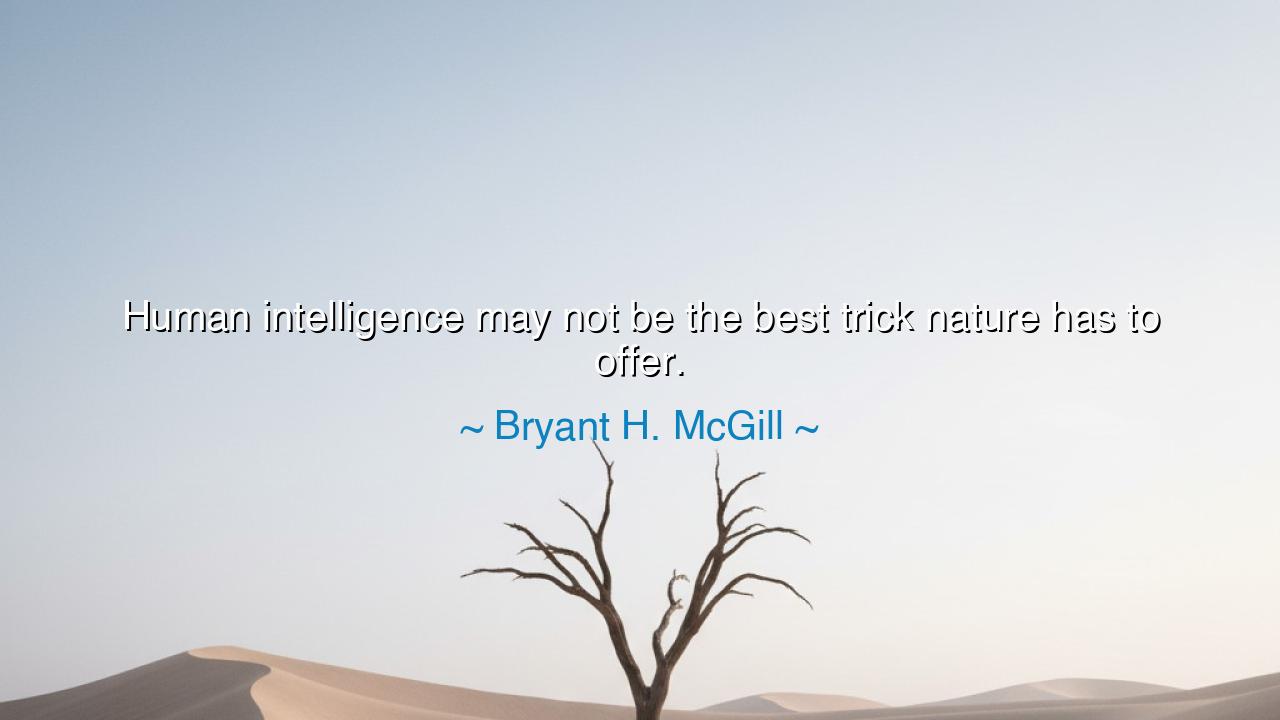
Human intelligence may not be the best trick nature has to offer.






In the striking words of Bryant H. McGill, "Human intelligence may not be the best trick nature has to offer," we are confronted with a provocative idea—a challenge to the notion that human intelligence is the pinnacle of natural evolution. McGill’s quote suggests that while intelligence has undoubtedly been one of humanity’s greatest tools, it is not necessarily the finest or most powerful gift nature has bestowed upon us. It is an invitation to reflect on the limitations of our intellect and the often underappreciated wonders of other aspects of the natural world. As humans, we have long viewed ourselves as the most intelligent beings on Earth, yet McGill urges us to reconsider: what if intelligence is not the ultimate measure of life's greatness?
This statement calls into question the very essence of what we value in our humanity. The ancients, in their wisdom, recognized that human reason—while valuable—was not the sole or final force guiding the universe. For example, Plato in his writings, particularly in The Republic, explored the idea that reason must be tempered by other virtues, such as wisdom and courage. The greatest philosophers knew that reason alone was not sufficient to understand the full depth of the human experience. There is a deeper, more intuitive understanding of life that cannot be captured by mere logic and analysis. In this way, McGill’s reflection on intelligence invites us to explore the limitations of human thought and to look beyond it for greater truths.
One might recall the story of Leonardo da Vinci, whose genius is still revered to this day. Yet, despite his remarkable intellectual capacity, it was his ability to see the world through the lens of curiosity and wonder that truly set him apart. Da Vinci's ability to observe nature with a sense of awe—whether in his study of human anatomy or his designs for flight—was not merely a result of intellectual rigor but of an intuitive, almost mystical connection to the natural world. He recognized that the wisdom of nature was not always contained in logic or reason, but often in the mystery and beauty of things beyond human comprehension. In this sense, da Vinci’s genius was not limited to his intellect but was amplified by his deep respect for the complexity and mystery of life.
In the same vein, the ancient Greeks held in high esteem the concept of phronesis, or practical wisdom, which was often seen as more important than pure intellectual ability. Aristotle, in his writings on virtue, argued that true wisdom required not just understanding but the ability to act in accordance with moral principles. This wisdom was not bound to intellect alone, but encompassed the whole person—mind, heart, and soul. Human intelligence, though crucial, was but one piece of the puzzle, and Aristotle’s teachings urged us to recognize the limitations of relying solely on the mind to navigate the complexities of life.
In modern times, we are constantly reminded of the limitations of our intelligence. The advances in technology and science have shown us that the more we learn, the more we realize how little we truly understand about the world and the universe. The mysteries of the universe, from the deepest parts of the ocean to the furthest reaches of space, remind us that there are forces beyond our comprehension—forces that may not be bound by human logic or intellect. Consider the recent breakthroughs in quantum physics, which have revealed the limits of our understanding of reality. The more we probe, the more questions emerge, suggesting that the universe operates on levels far beyond human reason, requiring us to embrace humility and curiosity.
McGill’s statement also invites us to consider the natural world as a source of wisdom beyond our intellectual understanding. In nature, there exists a form of intelligence far more ancient and profound than human reasoning. The instincts of animals, the cycles of the seasons, the complex ecosystems that sustain life—these are forms of wisdom that operate on a level beyond human comprehension. Bees build hives with intricate symmetry, birds migrate across vast distances with remarkable accuracy, and the ocean’s currents move in harmony with the rhythms of the Earth. These natural processes are governed not by the intellectual capacity of the beings involved, but by an innate wisdom that has existed long before humanity arrived on the scene. In this light, McGill’s quote challenges us to acknowledge that perhaps true wisdom lies not just in our ability to think, but in our ability to listen and learn from the world around us.
The lesson we can draw from McGill’s reflection is profound: intelligence is not the sole measure of greatness in life. While human intellect has brought about great advancements and understanding, there are forces and forms of wisdom that lie beyond our reason. We must recognize the limits of our intellect and, like the ancients, seek to cultivate a deeper understanding of life that goes beyond what we can simply calculate or reason. Let us embrace the mysteries of the world, not as things to be conquered, but as sources of wisdom that challenge us to think with humility and to act with grace.
As we move forward in our own lives, let us remember that intelligence alone does not define us. True wisdom comes from recognizing that there are mysteries and forces at play in our lives that go beyond reason—that the natural world, the human heart, and the universe itself operate on principles that transcend intellect. Let us seek not just to understand with our minds, but to listen with our hearts, to learn from the world around us, and to approach life with a sense of awe and wonder at the vastness of existence. Only then can we truly appreciate the full scope of wisdom that nature, life, and the universe have to offer.






AAdministratorAdministrator
Welcome, honored guests. Please leave a comment, we will respond soon